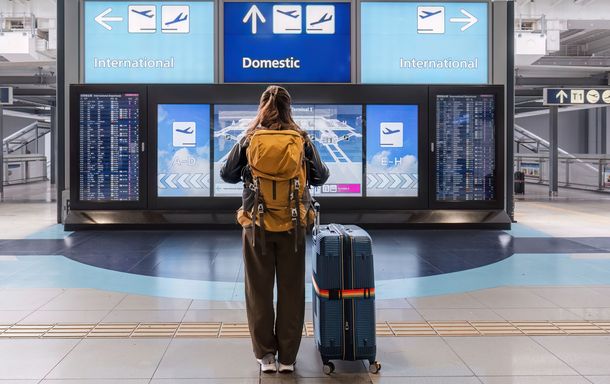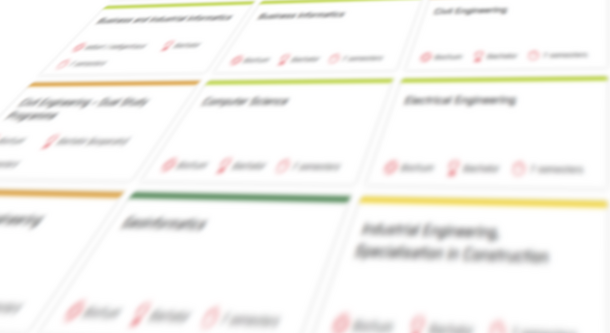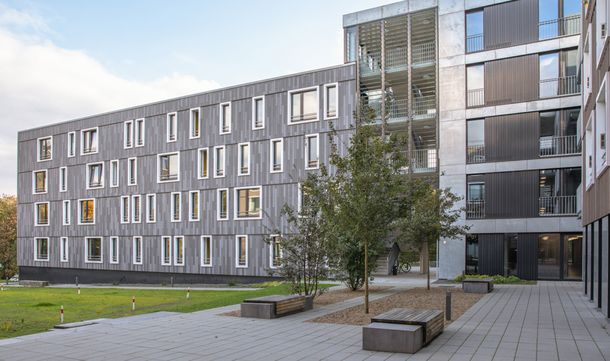Guide for International Applicants
- The application period for uni-assist applicants for the winter semester 2024/25 starts April 15, 2024 and ends June 15, 2024.
Step-by-Step Guide

This step-by-step will guide you from choosing what you want to study through applying for a visa and finding a student accomodation to enjoying your new life as a student in Bochum.
If you have further questions, feel free to contact our team at the International Office and we'll be happy to help. We wish you a lot of fun and success for your studies!

Uni-Assist can help you find out whether your university entrance qualification is valid in Germany. You can go to their help-page by clicking here:
Check: university admission | uni-assist.
Depending on your high school diploma university entrance can only be achieved with one of 3 possible ways of additional verification:
- Proof of a successful year of studying at any recognized university.
- Proof of passing the assessment test (Feststellungsprüfung) at a German Studienkolleg.
- Passing the TestAS exam with a percentile rank of at least 24 (arithmetic average of the core test and the subject-specific module test, digital and paper-based).

We provide an extensive selection of academic majors, each with its own distinct requirements. After choosing which programme suits you best, remember to check its specific admission requirements on the programme's page.
Most degree programmes require a German language certificate, and some also require an English certificate. You'll find more detailed information about language requirements for each offered degree programme here:
- Language requirements for Bachelor's degree programmes
- Language requirements for Master's degree programmes

Now that you have verified your university entrance qualifications, confirmed your eligibility for studying in Germany, and selected one or several preferred courses of study, please proceed as follows:
- EU citizens should submit their application via our application portal.
- Non-EU citizens apply through the www.uni-assist.de website.
EXCEPTIONS:
- German Spouse or Parent
- application for a higher semester
- high school graduation at a school within the European Union.
In these cases international students can apply directly using the application portal.
Ensure you have prepared all necessary documents before applying. Provisional certificates from a preparatory college (Studienkolleg) confirming admission to the assessment test (Feststellungsprüfung) are sufficient for applications within the application deadline. Proof of having passed the assessment test must be submitted by the start of the semester.
*Please note that the application period differs for applications through our portal and Uni-Assist.
Applications through Uni-Assist (non-EU applicants) start and end earlier.
If you can’t find a programme in the Uni-Assist search, the application period has either not yet started or already ended. Besides, some programmes only start in the summer/ winter semester.

Once you have been accepted, it is important that you enrol on time. After a successful application, you will receive an acceptance letter and further information concerning the enrolment process and necessary documents.
For the enrollment you will find your personal deadline in your letter of admission. You will have to enrol before the deadline in order to keep your admission.

Q: Do I need a visa and/or a residence permit?
If you are not a citizen of an EU‐country, you might need a visa for studying in Germany.
Citizens of EU member states, the European Economic Area and Switzerland:
- You don’t need a visa to enter Germany and study here.
- You have to register with the residents’ registration office.
- If you stay longer than 90 days, you need to apply for a residence permit in Germany.
Citizens of Australia, Canada, Israel, Japan, New Zealand, Republic of Korea and USA:
- No need for a visa to enter Germany.
- If you stay longer than 90 days, you need to apply for a residence permit in Germany.
Non-EU citizens:
- You need a visa if you stay longer than 90 days.
- Apply for your visa as soon as possible after you have received your admission. You have to apply for a visa in your home country.
- The Visa Navigator can help you find out whether you need a visa: https://www.auswaertiges-amt.de/en/visa-navigator/2315250
Q: Which documents must I submit to apply for a visa?
Non-EU students must apply for a residence permit with the Citizens' Office as soon as they arrive in Germany.
After registering at the Citizens' Registration Office, you will receive an invitation to an appointment from the Foreigners' Registration Office by post. This can take a few weeks.
To apply for the residence permit you must submit the following documents:
- ID/ passport
- Form Application for a residence permit
- Proof of financial resources
- Proof of health insurance coverage
- Letter of acceptance from the university
The fee for issuing the resident permit in Bochum is currently around €110. After a few weeks you should receive an E-Mail with an appointment to collect your residence permit (card).
You can find further information on the official website of Bochum's Citizens' Office.
Q: Can I study in Germany on a tourist visa?
You cannot study in Germany on a tourist visa. Neither is it possible to convert a tourist visa into a student visa. Please note that you must apply for a student visa!
Tourist and language course visas cannot be converted into a student visa. If you have the wrong visa, you will be forced to leave Germany at some point and apply for the correct visa in your home country.
Q: How do I get a residence permit?
After arriving in Germany, you must change your visa to a residence permit. To do so, contact the local foreigners’ registration office at your place of residence.
Q: Do I need proof of financial resources?
Everyone who needs a visa to enter Germany must submit proof of financial resources. Citizens of EU Countries don’t need to prove their financial resources, but they need to provide credible evidence of sufficient funding.
Before arriving in Germany, you need to prove that you have enough financial resources to support yourself. This document is called a Finanzierungsnachweis.
The necessary amount is calculated based on the average living cost per month in the city you'll be studying in. As of November 2023, the monthly living cost in Bochum is set to €934/ month, adding up to €11.208 for a year.
Q: Do I need health insurance?
In Germany, it's a legal requirement for all students to have health insurance. Here you'll find further information on different types of insurances and how to sign up.
Q: Where can I get health insurance?
Contact your health insurance provider in your home country to find out whether your policy is also recognised in Germany!
In some European countries students may present their European Health Insurance Card (EHIC) to prove that they have health insurance coverage in their home country and that their policy is also valid in Germany.
If your health insurance policy from your home country is not valid in Germany, you should sign up for coverage right after your arrival in Bochum. You may sign up with a public or a private health insurance provider. Bear in mind, however, that coverage will not start before the day you enrol at university.
Some public health insurance providers with special policies for students are:
Q: When do I have to submit a confirmation of my health insurance to Bochum University of Applied Sciences?
To complete your enrolment you must submit electronic notification of your insurance status (M10) from your health insurance provider.
Please contact your health insurance provider- the sooner the better.
Your provider will then send us the required notification.
For Bochum University of Applied Sciences the code H0000683 has to be indicated.

Where can I find accomodation?
When looking for accommodation, you can search in AKAFÖ housing estate or on the open housing market.
AKAFÖ housing estate
The AKAFÖ is the central contact point for student housing. The AKAFÖ residences offer a wide range of housing options for students - both in Bochum and Heiligenhaus.
Further information can be obtained from the Academic Funding Organisation: www.akafoe.de/wohnen
Open housing market
You can find many interesting housing offers on the Internet and in the daily newspapers. It is also worth taking a look at the university notice boards.
Housing adverts:
- wg-gesucht.de
- immo.muensterlandzeitung.de
- immobilienscout24.de
- studenten-wg.de
- immo-suche.net
- immowelt.de/suche/bochum/wg
- waz.immowelt.de
- www.meinestadt.de
- kleinanzeigen.lokalkompass.de/_/q/Immo-Kompass/m3 (for Heiligenhaus)
What do I need to consider after moving in?
After moving in, you should register with the residents' registration office within one week. Before this, you should decide whether Bochum or Heiligenhaus will be your first place of residence in the future. Specifically, this means that Bochum/Heiligenhaus is the future centre of your life and that you spend at least 183 days a year there. If this is not the case, Bochum/Heiligenhaus can become your secondary residence. (In Bochum, a second residence tax of approx. 12 per cent of the basic rent is due).
It should also be noted that any "ARD ZDF Deutschlandradio" broadcasting equipment will be transferred to you at the start of the re-registration process. If you receive BAföG, you can be exempted from the licence fee.
We give our best to make our page as informative as possible and make sure you find everything you need. At our welcome page for international students and refugees we publish information on topics such as life in Germany and being a student in Bochum, financing your studies, among others.
Special Topics
This page conveys the information shared here by the DAAD.
Preliminary note:
The following information refers to students who were granted a residence permit under paragraph 16 of the German Residence Act (§16 Aufenthaltsgesetz). Students with a permanent residency permit do not require a special working permit.
It also does not apply to most EU citizens and nationals of the EEA states and Switzerland. EEA states and Switzerland. It only applies to Bulgarian, Romanian, and Turkish students to a limited extent.
Legal basis:
International students with a residency permit under §16 of the Residence Act are allowed to work up to 240 half days or 120 full days in a year. This restriction generally applies regardless of the contract type (Minijob, Midijob, Internship, etc.).
Exception: so-called Studentische Nebentätigkeiten, that is, student part-time jobs that are based at the university or in the vicinity of the university (e.g., research assistant, jobs at the student union or AStA). In those cases, the restriction (240 half-days/ 120 full days) does not apply.
Anyone who wants to work more than 120 full or 240 half days in a job that is not a student part-time job, must obtain authorisation from the immigration foreigners’ authority.
Possible combinations:
Most students would like to work full-time during the semester break, and less during the semester. Combining full and half days is a possibility.
For example, if you want to work 22 full days in each of the two semester breaks, you still have 76 full days which can be divided into 152 half days through the semester.
Authorisation of longer/more frequent work by the immigration authority:
If you need to work more than 240 half days/ 120 full days and cannot do so in a part-time student job, you can ask to the Foreigners' Registration Office for permission.
This requires a concrete job offer with details of the duration and location of the working hours and salary/wage required. The foreigners’ authority will ask the employment agency for approval, which in turn will check whether there are suitable "preferential" unemployed persons available for the job, and whether the income meets the usual standards.
Even if the employment agency agrees, the immigration authority can refuse permission if they conclude that the work would jeopardize the success of your studies.
*Working more than you’re allowed to can lead to the immigration’s office decision to not extend your residency permit.
Self-employment:
If you would prefer to finance your studies through self-employment (e.g. as a translator, software developer, self-employed cleaner, music or language teacher, etc), it is also possible under residence law (§ 21 (6) Residence Act). However, the foreigners’ office must authorise the self-employment separately.
The condition is that the scope of the work may not jeopardise the success of your studies. It should therefore remain within the time limits of the rules for dependent employment. Anyone who wants to start a full-time business will not receive authorisation.
In addition to a permit from the foreigners’ authority, in some cases a licence to carry out the activity is necessary, in others a business registration. For freelancers, a tax number from the tax office is sufficient.
Where to find a job as a student:
If you are looking for a job and cannot find one through newspaper/internet adverts or personal contacts, check Catapult, our job portal.
If you are interested in working as a student assistant at our university, the Central Student Counselling Service constantly shares job postings for open spots on their Instagram profile (@zsb_hsbochum).
If you are interested in attending a preparatory (german) language course or need a visa while going through the application process in Germany, this information could be helpful.
- Visa to attend preparatory language courses (§ 16 Para. 1 AufenthG): Permitted for foreigners who wish to study at state or state-recognised universities. German language skills are proven by the DSH examination. The residence permit is issued for participation in a time-limited intensive language course, which can take place at universities or comparable institutions. As a rule, the preparatory study programmes may not exceed a total of 2 years.
As an international student at our university you may take part in our preparatory german course. You can find more information here.
- Visa for university applicants (§ 16 Para. 1a AufenthG): Authorised for foreigners who are staying in Germany for the purpose of applying to university. The maximum length of stay as a student applicant is nine months. Within this period, proof of admission to a degree programme or admission to a preparatory language course or preparatory college must be provided.
A Studienkolleg is an institution that prepares students, academically and linguistically, for their studies in Germany during a one-year course.
Visa to attend a preparatory college (Studienkolleg) (§ 16 Para. 1 AufenthG): Authorised for foreigners who wish to obtain the qualification for admission to university by attending a preparatory college followed by an assessment test. The Düsseldorf district government is responsible for applications for admission to a preparatory college in North Rhine-Westphalia. As a rule, the preparatory study programmes (language course and/or preparatory college) may not exceed a total of 2 years.
If you are interested in a Studienkolleg and have already been accepted for the entrance test, here are the basic steps for your residence permit. Detailed information can be obtained from the respective Studienkolleg (i.e. Studienkolleg Bochum: Preparatory College | Studienkolleg Bochum (studienkolleg-bochum.de).
1. Apply for a visa for study application:
- Once you have been accepted for the entrance test, you can apply for a visa to apply for a degree programme.
- The residence permit can last up to 9 months in accordance with § 17 Para. 2 AufenthG.
2. Convince the embassy:
- Show good school grades, a CV with no gaps and certified language skills (at least B1, better B2).
- Present a clear motivation to study and indicate a contact person in Germany who will support you.
- Ideally, you should be under 25 years of age and have relevant work experience or training related to the intended degree programme.
3. Master the entrance exam:
- The entrance exam consists of a language test (B1 recommended) and a subject test.
- Pass both parts in order to pass the preparatory course.
4. From the preparatory college to the degree programme:
- After successfully completing the Studienkolleg, you can take the assessment test, which is required for entry into a regular degree programme.
For more detailed information, please contact the Studienkolleg directly (as stated earlier). We look forward to welcoming you to Bochum University of Applied Sciences! If you have any further questions, please do not hesitate to contact us.

After enrolment
You're in? That's great!
Here you'll find everything you need to know about living in Germany, financing your studies, what Bochum has to offer and where you can get assistance when you need it.


